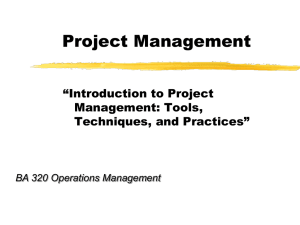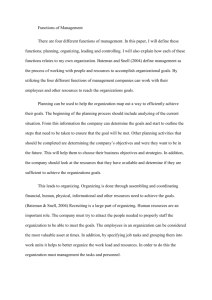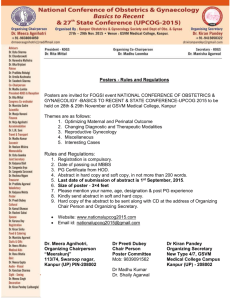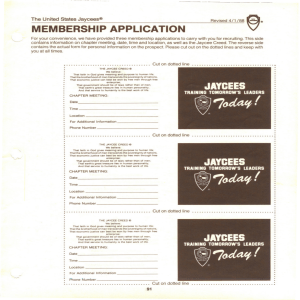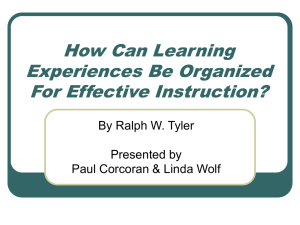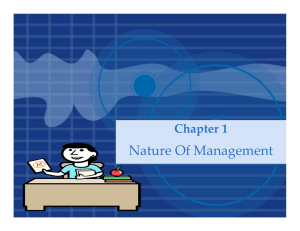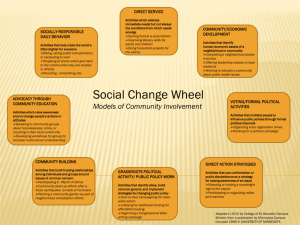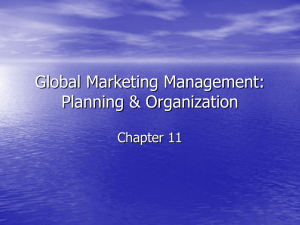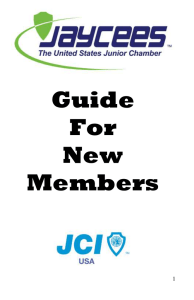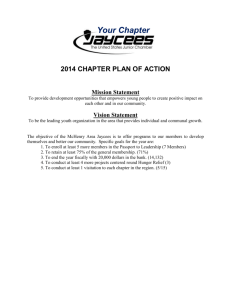ORGANIZING
advertisement
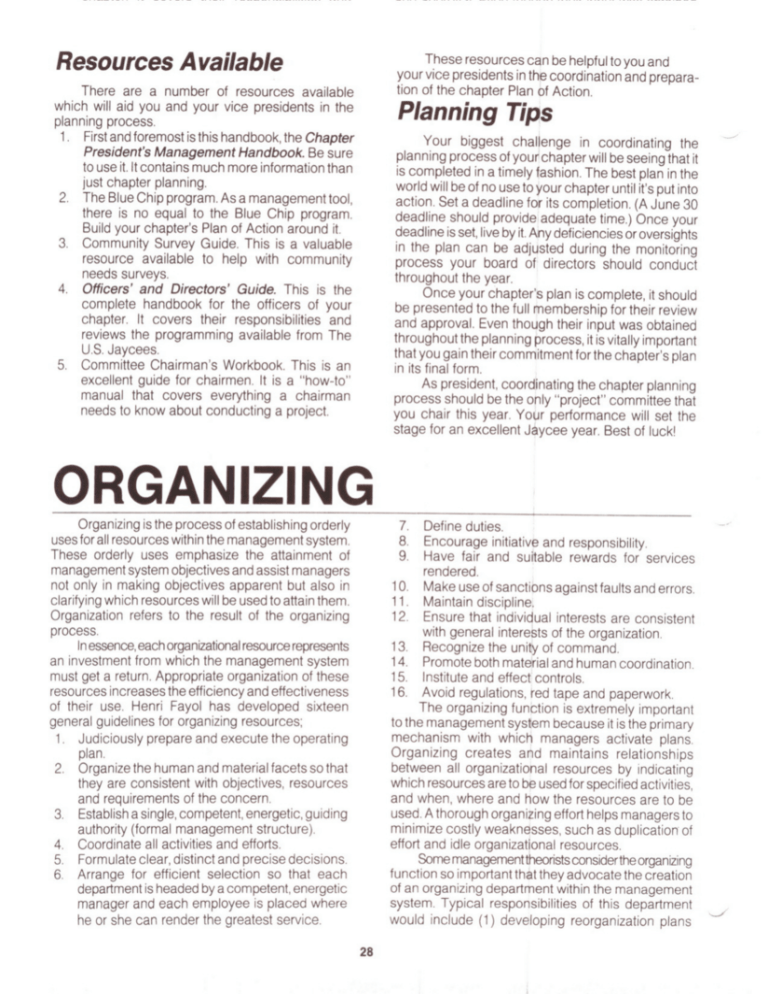
Resources Available These resources can be helpful to you and your vice presidents in the coordination and preparation of the chapter Plan of Action. There are a number of resources available which will aid you and your vice presidents in the planning process. 1. First and foremost is this handbook, the Chapter President's Management Handbook. Be sure to use it. It contains much more information than just chapter planning. 2. The Blue Chip program. As a management tool, there is no equal to the Blue Chip program. Build your chapter's Plan of Action around it. 3. Community Survey Guide. This is a valuable resource available to help with community needs surveys. 4. Officers' and Directors' Guide. This is the complete handbook for the officers of your chapter. It covers their responsibilities and reviews the programming available from The U.S. Jaycees. 5. Committee Chairman's Workbook. This is an excellent guide for chairmen. It is a "how-to" manual that covers everything a chairman needs to know about conducting a project. Planning Tip,s Your biggest challenge in coordinating the planning process of your' chapter will be seeing that it is completed in a timely fashion. The best plan in the world will be of no use to your chapter until it's put into action. Set a deadline for its completion. (A June 30 deadline should provideladequate time.) Once your deadline is set, live by it.Any deficiencies or oversights in the plan can be adjusted during the monitoring process your board of directors should conduct throughout the year. Once your chapter's plan is complete, it should be presented to the full membership for their review and approval. Even though their input was obtained throughout the planning process, it is vitally important that you gain their commitment for the chapter's plan in its final form. As president, coordinating the chapter planning process should be the only "project" committee that you chair this year. Your performance will set the stage for an excellent Jaycee year. Best of luck! ORGANIZING 7. 8. 9. Define duties. Encourage initiative and responsibility. Have fair and suitable rewards for services rendered. 10. Make use of sanctions against faults and errors. 11. Maintain discipline, 12. Ensure that individual interests are consistent with general interests of the organization. 13. Recognize the unity of command. 14. Promote both material and human coordination. 15. Institute and effect controls. 16. Avoid regulations, red tape and paperwork. The organizing function is extremely important to the management system because it is the primary mechanism with which managers activate plans. Organizing creates and maintains relationships between all organizational resources by indicating which resources are to be used for specified activities, and when, where and how the resources are to be used. A thorough organizing effort helps managers to minimize costly weaknesses, such as duplication of effort and idle organizational resources. Somemanagementtheoristsconsidertheorganizing function so important that they advocate the creation of an organizing department within the management system. Typical responsibilities of this department would include (1) developing reorganization plans Organizing is the process of establishing orderly uses for all resources within the management system. These orderly uses emphasize the attainment of management system objectives and assist managers not only in making objectives apparent but also in clarifying which resources will be used to attain them. Organization refers to the result of the organizing process. Inessence,each organizationalresourcerepresents an investment from which the management system must get a return. Appropriate organization of these resources increases the efficiency and effectiveness of their use. Henri Fayol has developed sixteen general guidelines for organizing resources; 1. Judiciously prepare and execute the operating plan. 2. Organize the human and material facets so that they are consistent with objectives, resources and requirements of the concern. 3. Establish a single, competent, energetic, guiding authority (formal management structure). 4. Coordinate all activities and efforts. 5. Formulate clear, distinct and precise decisions. 6. Arrange for efficient selection so that each department is headed by a competent, energetic manager and each employee is placed where he or she can render the greatest service. 28 that make the management system more effective and efficient,(2) developing plans to improve managerial skills to fit current management system needs, and (3) attempting to develop an advantageous organizational climate within the management system. provide you a means to manage a chapter of any size. There are several key points to understand before you attempt to develop your system. They include: 1. No more than ten chapter officers should report directly to the president. 2. Your chapter should have at least four vice presidents; i.e., Community Development, Individual Development, Management Development and Membership Development. 3. Personalaides may report directly to the president and do not need to be included in the structure. They will increase the president's ability to manage the chapter, not interfere with it. 4. It is important that every officer has a clear understanding of the chapter structure and their responsibility. 5. It must provide rapid two-way communication. As you develop your chapter's structure, you must address the needs of your members. It should also provide for as much involvement as possible. Make sure you allow for the expansion of your chapter as you grow. To develop your chapter structure, begin with the placement of your key officers. These key officers should all report directly to you, the president. This can be graphically shown as follows: The Organizing Process The five main steps of the organizing process are: (1) reflecting on plans and objectives, (2) establishing major tasks, (3) dividing major tasks into subtasks, (4) allocating resources and directives for subtasks,and (5) evaluating the results of implemented organizing strategy. Chapter presidents should continually repeat these steps. Through this repetition, they obtain feedback that will help them improve the existing organization. Chapter Management System You are the chief executive officer of your chapter. But, no matter what size your chapter is, you cannot effectively manage it by yourself. An organizational structure or chapter management system will Stale Director of Jaycees programs. If one of their members misses a function, they should contact them to encourage them to continue their participation. As you can see, there are eight key chapter officers reporting directly to you. If the size of your chapter dictates additional officers, they can be added into the system, Each officer's responsibility will include the supervision of their respective areas, as well as portions of the Blue Chip requirements and the development of the chapter plan. As the system is expanded, you will see how the directors are the direct responsibility of your vice presidents. The vice presidents will supervise their assigned directors and report to you regarding their performance. The directors will be charged with the responsibility of communicating with and activating the members of the chapter. They will have specific members assigned to them. They should assist their members with the Springboard and Degrees Major Emphasis Area Major Emphasis Areas (MEAs) are broad areas of priorities. They are divided between the four primary recognition areas: Community Development, Individual Development; Management Development and Membership Development. Each of these areas is vital to the leadership development of Jaycees. Your chapter will determine priorities based on the MEAs within each programming area. Following are the types of projects which would fit into each MEA. Any project may fit under a single MEA category as long as its primary purpose is to meet the major emphasis of that area. 29 Individual Development Management This MEA category includes all programs with the purpose being to build leadership skills.The following U.S.Jaycees programs go into this category: Personal Dynamics, Leadership Dynamics, Communication Dynamics, Time Dynamics and Speak-Up. Through participation in these programs, members will acquire information to help define and develop their leadership, communication, management and speaking skills. Family Life/Spiritual Development. This category includes all The U.S. Jaycees' Family Life programs (All in the Family and Family Time) as well as any other defined family program or project. Any project designed primarily to increase or enhance spiritual activities by your members or people in the community are also included in this category. Personal Skills. This MEA category includes all projects or programs conducted with the primary purpose to increase or enhance the personal skills of individual members. This category also includes The U.S. Jaycees programs, Personal Financial Planning, Stress Endurance and Job Search. Leadership Development. Development This category includes all facets of chapter planning, needs analysis, evaluation, the chapter plan of action and the planning guide for chapters. It also includes events scheduled to facilitate the surveying, planning and evaluation of the chapter's plan of action, i.e.,a weekend planning retreat or organizing teams to canvass neighborhoods for responses to a community needs analysis. Training. This category includes all training programs aimed at members, covering job descriptions and responsibilities of officers and chairmen, local officer training, training for project chairmen, how to do a Chairman's Planning Guide, etc. Financial Management. Includes all projects or programs conducted to manage the financial aspects of the chapter. For example, projects which deal with raising funds for operation of the chapter - ways and means such as raffles, concession stands, Christmas tree sales, and dances. It also includes financial and b8dget reports relating to the overall finances of the chapter, including monthly budget reports and annual audits combined into a total financial managem~nt plan to be implemented during the year. Personnel Management. This category includes all chapter meetings, campaigns, elections, sports, on-to, visitations, bidding or hosting meetings and socials, awards and activation programs such as Springboard and Degrees of Jaycees. Communication. This category includes all chapter communication tools and methods used, chapter publications, special mailings, special event promotions, committee structures and phone calling system .. Public Relations. This category includes all projects conducted to promote the image of your chapter and the Jaycee movement in your community, such as community recognition programs, Distinguished Service Awards programs, parades, pageants, ongoing public relations work and the chapter photographer. Also included would be recognition of local merchants, and annual progress report in your local paper or on television. Planning. Community Development. Human Services. This category includes all projects designed to promote or improve the quality of human life. Any project with the purpose of working directly with people would be incluQed. Shooting Education; Big Brothers and Big Sisters; ElderlyAssistance; International Involvement; Special Olympics and Drug and Alcohol Awareness programs are just some examples of Human Services projects. Community Improvement. This category includes all projects which improve resources and facilities; promote conservation and enhance the environment in your community. Any project with the purpose of working with properties and non-human resources would be included. Projects such as Energy Audits, City Beautification, Recycling Centers and Housing Winterization would be included in this area. Government Involvement. This category includes all projects of a governmental nature designed to provide better public services and promote "pride in America." Candidates Night, Voter Registration and Model Legislature are some examples of Government Involvement. Projects that deal with criminal justice, such as programs on employment of exoffenders and crime prevention are also included. Community Fundraising. This category includes all projects with a primary purpose to raise funds for a specific program. These are projects which deal with fund raising for health-related organizations, foundations or any other community activity. Muscular Dystrophy, St. Jude Children's Research Hospital, March of Dimes and Heart Association are just a few of the numerous examples in this area. Membership Development Recruitment and Orientation. This category includes all projects conducted with the primary purpose of obtaining new members for the chapter such as M-nights, membership booths, orientation programs for members, etc. Retention. This category includes all projects conducted with the primary purpose of encouraging members to renew their membership prior to or during their anniversary month. Affiliations/Chapter Assistance. This category includes all projects conducted with the primary 30 -..J purpose of affiliating new chapters or assisting existing ones primarily in the area of membership recruitment. Each Major Emphasis Area is actually a classification of needs within your community or chapter. These should be determined and prioritized at the beginning of the year through use of the Planning Guide For Chapters. Knowing the needs in your community and chapter will allow for more concise planning as to what projects should be conducted to meet these needs. All projects in a given MEA will be evaluated, based on the information developed in the Planning Guide for Chapters, to determine the chapter's impact and effectiveness in meeting the needs established. Each director with MEA responsibilities should be responsible for each project chairman in their area, monitoring results toward the goal in that area and compiling the MEA entry for judging. STAFFING do during your year and it will set the pace for them to follow. If you ask your members to recruit, they will watch what you do to gauge the importance of your request. If you can speak from practical experience of the how-to's and personal satisfaction of recruiting, your members will follow your lead. As you have already set your growth goals for the year, you can begin to make your members aware of the needs of the chapter each month. There is a section near the end of this handbook on membership incentives and contests that will help you and the Membership Development vice president set up your chapter's incentive plan and reach your chapter's goals. Defining Staffing Staffing is determining the personnel you will need to complete your chapter's objectives and how you plan to recruit those individuals. The staffing management function also includes the development of new, as well as existing, personnel. Finding Prospective Members Sharing the Jaycee Movement Fortunately,the biggest resource your community can offer your Jaycee chapter is people. Prospective Jaycees are everywhere. More than 98 percent of your potential members have yet to be asked to join. Here are some marketing areas your chapter may want to tap. Your Present Membership - The best source of new members is your current membership, if you give them the proper motivation. Many times your current members claim they don't know any prospects. However, ask them about the young people: a. they work with. b. they know who are just back from military service or college. c. who live in their neighborhood. d. who work for other firms they deal with clothing stores, department stores, banks and The most vital part of your chapter is the people involved -your members. New ideas, enthusiasm and fresh outlooks are introduced to your chapter every time you induct new members. Since people are the lifeblood of your organization, it is important to replace those members who age out, move out of the community or move on to other interests. Remember, your chapter can have a greater impact and offer more services to your members and the community through more people. It is important that you set the example as a SO recruiter to your members. They will follow what you 31 on.
